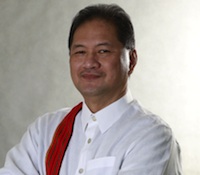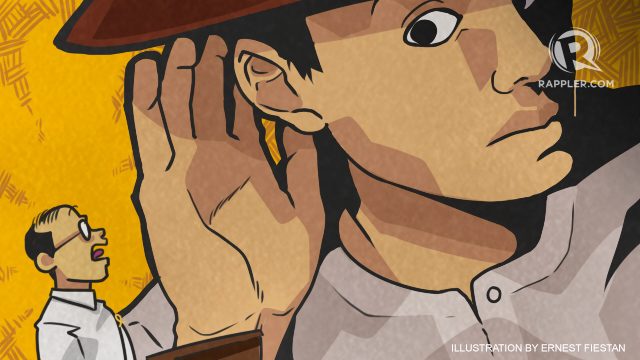SUMMARY
This is AI generated summarization, which may have errors. For context, always refer to the full article.
 All eyes will be on the President this Thursday, March 26, during the Philippine National Police Academy (PNPA) graduation ceremonies. It will be a tough audience, an angry and anxious one, from what I have gathered.
All eyes will be on the President this Thursday, March 26, during the Philippine National Police Academy (PNPA) graduation ceremonies. It will be a tough audience, an angry and anxious one, from what I have gathered.
Its a pro-[Getulio] Napeñas audience, I think; most police I know believe the Special Action Force (SAF) commander has been unfairly made the scapegoat for mistakes committed by Alan Purisima and the President. True or not, this is what the President is up against when he speaks to the PNPA cadets and the PNP command.
But beyond the audience at the PNPA is the nation. In my view, this speech presents an opportunity to turn around the unfavorable political situation that the President is currently in. He will not have this opportunity again until the State of the Nation Address in July, the last for the President’s term, and that might be too late to reverse the political damage.
The goal of the speech should not be to please the President’s die-hard critics, those who seek his ouster, as nothing he says will please them. The audience the President wants to reach and persuade is those who are upset by what happened in Mamasapano and the President’s actions after that, those who want the country to move on but want to have some kind of closure on this issue. Such closure is not necessarily full justice and accountability but at least a sense that we know all the facts and more importantly, an assurance that Mamasapano will not happen again because the President has instituted reforms in the way he governs.
In my view, an apology is not essential for the speech. I do not necessarily agree with Senator Bam Aquino that showing regrets would be a trap, as most people would accept it as a sign of humility. This is especially true for that mistake of not being in Villamor Airbase when the bodies of the SAF 44 died. Manolo Quezon has written a good apologia for the President’s decision, attributing it to the governance and leadership style of the President, but nevertheless it was objectively a mistake. Apologizing specifically for that mistake would be healing.
Acknowledge mistakes
One thing I do not want to hear from the President is his contesting the findings of the Board of Inquiry and Senate reports. He should thank the two bodies for their hard work while acknowledging that he might have differences with their conclusions. Unless the President is ready to accept the creation of a Truth Commission, what are in the BOI and Senate reports are the nearest thing to objective and independent findings on the Mamasapano events.
More than an apology, the acknowledgment of mistakes committed is critical. And here, it becomes tricky. The President must look seriously at what mistakes he did commit. So far, we know that he believes his mistake was in trusting that suspended PNP Chief Alan Purisima and SAF Commander Napeñas would follow his orders to coordinate with the military. Related to that is his belief that he was misled by both of these police officers on the plan and the situation on the ground.
The problem with this approach is that here we see the President blaming subordinates and not really holding himself accountable. It makes Mamasapano a freak event, an irregularity that is entirely due to two subordinates who had their own agendas. Under this approach, the President is actually a victim like the rest of us. He is not the primary cause, the reason why Mamasapano happened; he does not have to change anything in his decision-making or governance processes because he was taken for a ride.

Seek understanding with humility
Asking for understanding is the right approach and tone. But it should be conveyed with humility, and not superiority or with an excusing tone. I do not mind if he mentions Napeñas in his speech but once is enough. His audience will probably appreciate that. As for Purisima, a few more tough words are probably expected from the President.
Personally, I would like the President to own up to the mistake of involving a suspended Alan Purisima in Oplan Exodis. There is no justification for this – the argument that Purisima knew most about the situation does not wash. The moment he was suspended, he should have been out of the loop. The law about this is clear. There was usurpation of authority here as the Senate Report has pointed out. It would be good for the President to at least acknowledge that Purisima must be charged with this crime. People expect the President to cut cleanly and make a complete break from his close friend. Painful as it is, this must be done with the greatest clarity of words and actions.
Whether the President himself violated a law for allowing Purisima to be involved in Oplan Exodus will have to be subject to a later proceeding. I reserve my opinion on that.
Rethink the vision for peace
Finally, I would also like to hear from the President how he reconciled his decisions on Mamasapano with the peace process in Mindanao. For the record, I have been supportive of that process and of the officials who have pushed this forward in the past few years.
As I have written in many papers, articles, and columns, my support has always been qualified and I have made numerous suggestions along the way, including how to improve the BBL. But overall, we have been on the right track. And then Mamasapano happened.
I would like the President to persuade us that the decisions he made with respect to Mamasapano were in pursuit of the path of peace. Up to now, frankly, many people cannot reconcile this and that is why the peace process is now in peril. A reiteration, or a rethinking of the vision for peace, would be good for the country.
Accountability
The last thing I would like to hear from the President are what concrete actions he will now take to hold Napeñas and Purisima accountable, those who are criminally liable for the deaths in Mamasapano, the systemic governance changes necessary so this will not happen again, and most of all the next steps for the peace process.
I will not mind if the President announces a less ambitious timetable for the Bangsamoro Basic Law as long as a transition plan is articulated.
I am not for impeachment and for resignation. I will certainly oppose an extralegal solution to our political situation. I think that the Aquino administration has done a lot of good for the country. It’s not the best government we ever had and it is not been perfect (the country will pay a high price in the future for this government’s failures in transportation and energy infrastructure) and, certainly not corruption-free – but the administration has done a lot in such areas as economic and budget reforms, education, poverty, anti-corruption, and peace. I would like President Aquino and his team to finish their work and transfer the next tasks properly to a new government in 2016.
Like many Filipinos, I am ready to move on. I hope the President’s speech this Thursday will make that happen. – Rappler.com
Add a comment
How does this make you feel?
There are no comments yet. Add your comment to start the conversation.